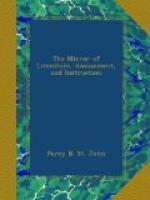When we bring into one view all the qualifications of Mozart as a composer and practical musician, the result is astounding. The same man, under the age of thirty-six, is at the head of dramatic, sinfonia, and piano-forte music—is eminent in the church style—and equally at his ease in every variety, from the concerto to the country dance or baby song: he puts forth about 800 compositions, including masses, motetts, operas, and fragments of various kinds; at the same time supporting himself by teaching and giving public performances, at which he executes concertos on the piano-forte, the violin, or the organ, or plays extempore. But when we learn that the infant Mozart, at four years of age, began to compose, and by an instinct perception of beauty to make correct basses to melodies; and also that he became a great performer on two instruments, without the usual labour of practice, we cease to be surprised at the mechanical dexterity of his fingers in after-life, when composition and other pursuits had engrossed the time usually employed in preserving the power of execution.
The father of Mozart held the situation of Vice Kapell-meister and violinist in the chapel of the archbishop of Salzburg. In the service of this haughty and ignorant nobleman, (who appears to have been a complete feudal tyrant, and to have represented all the pride and insolence for which the then beggarly-princes of Germany were remarkable), he was so ill paid, that notwithstanding his utmost exertions as an instructor, it was with difficulty he supported a wife and family. Anna Maria,[3] born August 29, 1751, and Wolfgang Amadeus Mozart, born January 27, 1756, were the only two of seven children who survived. The sister made such progress on the harpsichord, that in the first journeys which the father took in order to display the talents of his children, she divided the public attention with her brother. Wolfgang, however, not only profited as a player, from the careful instruction which both the children received from their parent, but began then to exhibit the extraordinary precocity of his musical mind; the minuets and other little movements which he composed from the age of four to seven show a consistency of thought and a symmetry of design which promised a maturity of the highest genius. Of the first expedition of Leopold Mozart with his son and daughter, in January, 1762, little account is preserved, further than that they visited Munich, and played concertos on the harpsichord before the royal family. In the following autumn, (Wolfgang being then in his seventh year), the father proceeded in the same company to Vienna; the journey was made by water, and the family gave concerts at the principal towns they passed, as occasion served. Leopold Mozart writes, “On Tuesday we arrived at Ips, where two Minorites and a Benedictine who accompanied us said mass,[4] during which our little Wolfgang tumbled about upon the organ and played so well,




